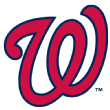In baseball, winning in October isn't quite the same task as winning in April through September. It's not some abstract will to win or aura or mystique or anything of that nature, but the simple reality that winning in a short series requires different planning than winning over 162 games. Your stars don't get normal days off, situational players such as pinch runners become more employable, and the front of your rotation and bullpen play a more prominent role.
When it comes to lineups, your choices are more situational than over the long haul. Each game is vastly more important than games played over the long grind, and far more scrutiny is given to individual matchups. And though pitching gets all the clichés, offense is extremely important. Seven of the eight teams remaining in this year's playoffs had offenses that were above average in 2019 (the Cardinals are the exception).
So what will determine which teams' offenses will come out on top?
 Los Angeles Dodgers
Los Angeles Dodgers
One wouldn't think a team that led the National League in runs would have any noted weaknesses, but the Dodgers do: breaking pitches. Per 100 curveballs thrown in 2019, the Dodgers were second-worst of the remaining teams, scoring just a tenth of a run. By comparison, the league-leading Astros scored an entire run every 100 curveballs they faced.
As seen against Stephen Strasburg, a good curveball can mow down the Dodgers. Nats pitchers led the majors in curveball value, but they were followed closely by the Rays (2nd), Braves (4th), Yankees (5th) and Astros (7th). L.A.'s fate in October might come down to resolving its trouble with the curve.
 Washington Nationals
Washington Nationals
With the National League's second-best offense in 2019, the Nationals got where they are in large part by bashing lefties, with an OPS 42 points higher than against righties during the regular season. Just as Strasburg provided a cautionary tale, so did Walker Buehler. The Nats were far more effective against Clayton Kershaw than Buehler. Victor Robles' day-to-day injury complicates matters, as his replacement, Michael Taylor, furthers this issue with some fairly extreme platoon splits, with a .778 OPS and .332 wOBA against lefties this season and .593 and .261 against right-handers.
 New York Yankees
New York Yankees
The Yankees are a thoroughly modern offense, but they appreciate the value of aggression, avoiding the passivity trap that three-true-outcomes offenses can occasionally fall into, something I usually refer to as Ben Grieve Disease. When the Yankees have gone after the first pitch, they've hit .297/.324/.552 and their .877 OPS is the best in baseball by a whopping 43 points over the Boston Red Sox. Taking the first pitch, that figure drops to a still excellent but distinctively worse .805. This isn't a call to start swinging at whatever junk gets thrown at 0-0 if teams start to adjust, but the Yankees have been the most dangerous when they've been ruthlessly aggressive from the start of their at-bats.
 Houston Astros
Houston Astros
The Astros, on the other hand, have been the exact opposite of the Yankees. They were one of the rare teams to hit better when not being aggressive early in the count in 2019. Houston as a team doesn't really have an offensive weakness -- it ranked near the top of the league in almost every split and against every kind of pitch -- so perhaps the best advice for Houston is to resist any impulse to change its approach just because it's October. Given the team's strong sabermetric leanings, I'm optimistic the Astros will.
 Minnesota Twins
Minnesota Twins
In the past, Twins teams that have made the playoffs have had impressive home-field-advantage splits. But that's not the case in 2019. The team relied on the home run while playing in a park that's not particularly well suited to home run hitters, resulting in many more homers on the road (170) than at home (137).
That was a big reason the Twins had a .568 winning percentage at home compared to .679 on the road in 2019. It makes those road games in home run hitters' parks all the more important, to the extent that the team might actually be happy to not have home-field advantage against the Yankees.
If the Twins can't take advantage of their games in hitters' parks, their 2019 postseason might be over fairly quickly.
 Tampa Bay Rays
Tampa Bay Rays
With one exception, every team remaining the playoffs was above average at hitting fastballs in 2019, and the top seven in baseball all made the playoffs. As you might have guessed, the Rays are the exception.
Complicating that challenge is that Houston's big three -- Gerrit Cole, Justin Verlander and Zack Greinke -- are all excellent fastball pitchers, ranking first, 14th and 11th, respectively, in MLB in fastball value. It's not just a speed thing, as seen by Greinke's 88 mph fastball. The Astros' bullpen is actually below average in terms of fastball performance, so it's in the Rays' interest to push Houston's starters for every pitch they can. The sooner they get to that bullpen, the better.
 St. Louis Cardinals
St. Louis Cardinals
Despite a lineup with Paul Goldschmidt, Marcell Ozuna and Matt Carpenter, St. Louis struggled to score runs in 2019, finishing 10th in the National League in the category. I hate the old chestnuts about teams needing to manufacture runs in October, but it's more or less true in St. Louis' case. With a .619 winning percentage in games in which they homered and a .409 winning percentage in games they didn't, the Cardinals had one of the smallest differences in 2019.
Not many teams can play .400 ball without hitting a home run, as demonstrated by the league's .272 record in those games in 2019. But for a team that's so likely to not hit a home run -- St. Louis' 44 games without a homer was the most for playoff teams -- it really needs to manufacture those runs using non-homer means.
 Atlanta Braves
Atlanta Braves
One thing the Braves struggled with, relatively speaking, was hitting fly ball pitchers in 2019, with their .759 OPS against them ranking just 17th in the MLB. That's good news, as they face off against the Cardinals, the team with the fewest fly ball pitchers (other than the Braves) of the remaining teams. The Nats, on the other hand, allow a lot of fly balls. Though the Braves went 11-8 against them in the regular season, they were actually outscored in those games overall.
